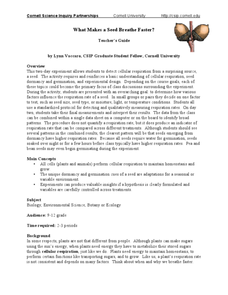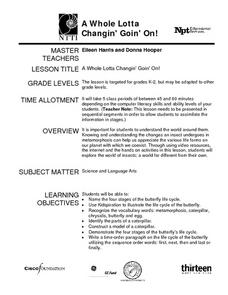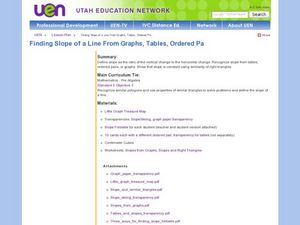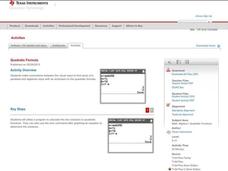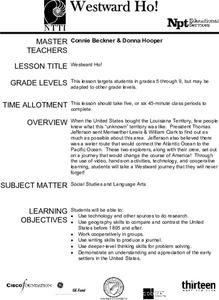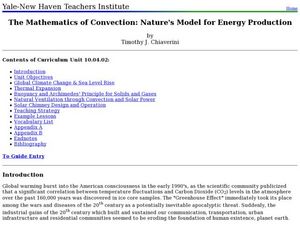Curated OER
Cell Size and Shape; Diffusion and Osmosis Processes
Use salmon eggs as a cell model for demonstrating the movement of water over concentration gradients. Junior scientists examine the same process microscopically with an onion cell. They use a thistle tube and a semipermeable membrane to...
Curated OER
What Makes a Seed Breathe Faster?
Here's a five-star lesson plan in which inquisitors conduct sophisticated experimentation with cellular respiration in plant seeds. Placing seeds in a closed system they measure the amount carbon dioxide produced and relate it to...
Curated OER
A Whole Lotta Changin' Goin' On
Here's a fabulous lesson on the life cycle of a butterfly. Youngsters are able to identify and understand the four stages of life. They construct models of a caterpillar and write a sequence story about the life of a butterfly. This...
National Security Agency
A Balancing Act: Solving Multi-Step Equations
Wow! Put on that thinking cap and solve multi-step equations. To solve equations, learners review the use of the distributive property and combining like terms. This three-day lesson comes with about 20 pages of worksheets, warm-ups,...
Utah Education Network (UEN)
Finding Slope of a Line from Graphs, Tables, and Ordered Pairs
Middle schoolers explore the concept of slope in numerous ways and start to look at simple linear equations. They describe the slope in a variety of ways such as the steepness of a line, developing a ratio, using graphs, using similar...
Curated OER
Solar Kit Lesson #15 - Solar-Powered Electrolysis of Water and the Hydrogen Economy
An outstanding lesson plan awaits your physics fledglings! After reading about how hydrogen can act as an energy carrier, they examine the electrolysis of water using solar power. They test the gases produced for flammability and will...
Curated OER
Solar Kit Lesson # 12 - Calibration Curve for a Radiation Meter
Scientists need to have mastered algebraic slope-intercept concepts in order for this instructional activity to be effective. They will measure and graph solar panel output as a function of the amount of radiation striking it,...
Curated OER
Solar Kit Lesson #7 - Positioning Solar Panels I: Explorations with Tracking
For this first part of a two-part lesson, learners track and record the sun's azimuth using a solar panel. They graph and analyze the data to identify relationships among the time of day, the altitude and azimuth of the sun, and the...
Curated OER
Solar Kit Lesson #3 Parts of a Solar Panel - Part I
A solar cell is similar to a rechargeable battery in many ways. Science lab groups connect each in a series circuit to run a mini motor and then compare and contrast them by answering questions and completing a Venn diagram. This is an...
Curated OER
Solar Kit Lesson #9 - Properties of Solar Radiation: Reflection, Transmission, and Absorption
Middle school science stars observe and record data on the solar radiation reflected off or transmitted through various materials. They predict properties for various materials, and test their predictions by touch. This lesson becomes...
Curated OER
Assessing Research Materials
Teaching learners how to evaluate a research source is an important part of the research process. The fresh idea here is that groups first develop a list of reasons why resources should be evaluated, transform these reasons into...
Curated OER
Using Environmental Models to Determine the Effect of Acid Rain on an Ecosystem
Demonstrate to your middle school science learners how chalk breaks down in a weak acid. Discuss what affects acidic rain might have on ecosystems. Lab groups then choose one of two questions: "How does acid precipitation affect an...
Curated OER
Energy for Earth: The Sun
Super science learners examine the sun's production of energy by the process of nuclear fusion. Hands-on activities make this lesson engaging for middle schoolers. The lesson is made up of four parts. Part I is an introduction to the sun...
Curated OER
Quadratic Formula
This worksheet is part of the TI-Nspire lesson on the quadratic formula. Pupils determine the solutions of a quadratic function by looking at a graph and the discriminant. They use the quadratic formula to solve quadratic functions on...
Curated OER
Carnival of the Animals and Aquarium and Magic Fish
Engage little learners in this moderately developed three-lesson unit on the composer Camille Saint-Saens and his piece "The Carnival of Animals." Each lesson includes a listening, discussion, and an art project to engage your class in...
Curated OER
Westward Ho!
For any teacher of American History, The Lewis and Clark Expedition is a watershed event that should be shared with your students. This is a very good lesson on the Expedition, and the events that led up to it; including The Lousisiana...
Curated OER
The Mathematics of Convection: Nature's Model for Energy Production
High schoolers conduct a series of experiments to investigate density, buoyancy and climate. In this math lesson, pupils design and build a hot air balloon to demonstrate convection. They research and write a paper about solar chimneys.
Curated OER
How Dense is Salt Water?
Young schoolers explore the concept of linear regression. They determine the mass and density of salt water. Pupils add salt to water and record the density as salinity increases, and perform a linear regression on the data to model the...
Curated OER
Regular Coke vs. Diet Coke: Which is Denser?
Learners define the terms "mass," "volume," and "density." The relationship between these three terms is established. They observe the differences between Regular and Diet Coke. They develop an hypotheses about why a can of Regular Coke...
Curated OER
Mystery Liquids: Linear Function
High schoolers determine the linear equations of the density of water and oil by collecting data on the mass of various volumes of each liquid. They construct scatter plots from the data and use these to write the linear equations for...
Curated OER
Is There a Limit to Which Side You Can Take?
Calculus students find the limit of piecewise functions at a value. They find the limit of piecewise functions as x approaches a given value. They find the limit of linear, quadratic, exponential, and trigonometric piecewise functions.
Curated OER
Discovering Pi/Welcome to Pi Day
Students explore pi. In this circle measurement lesson, students define and identify radius, diameter, circumference, and perimeter. Students work in groups to measure several plastic lids and record their findings. Students compare the...
Curated OER
Ceramic Wall Tile Murals
Grab your class and start brainstorming an image you'd like to see as a mural. Included here are all the steps needed to design and create a ceramic wall mural. The kids come up with the drawings, then they each make a tile that will...
Curated OER
Archeologists For a Day
Students listen to a reading about fossils and go on a hunt for items with fossil characteristics. In this cross curricular fossil activity, students will examine their fossil finds and create a graphic organizer. Students...



